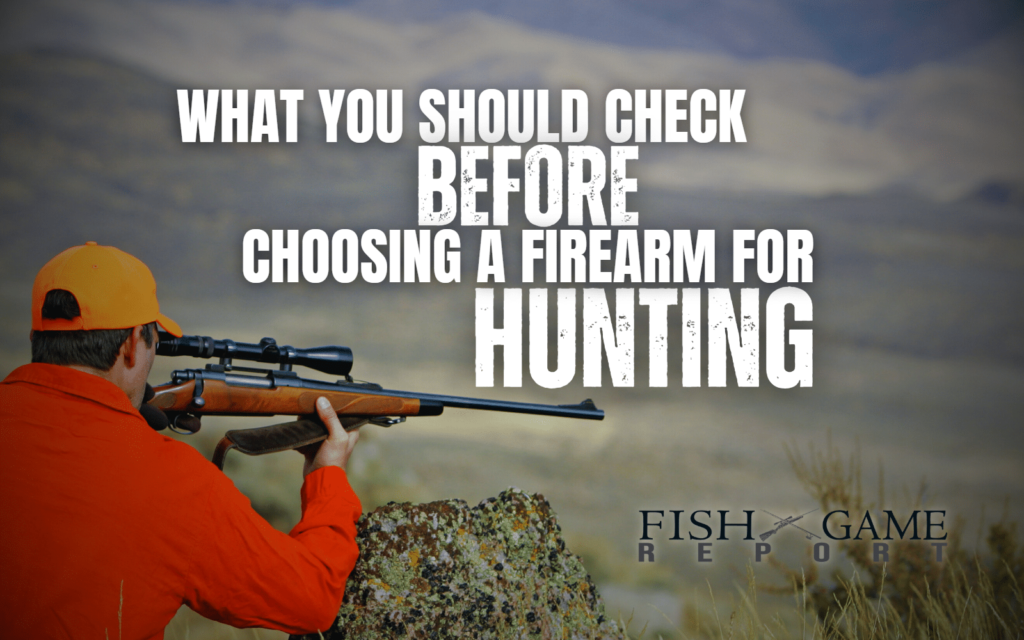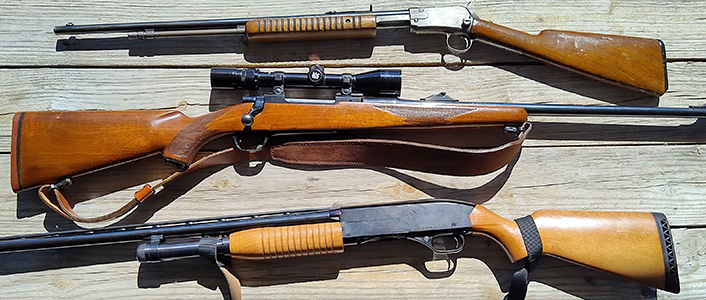
Have you ever wondered what you need to consider when choosing a firearm for hunting? Whether you’re a seasoned hunter or just starting out, it’s important to know what factors to keep in mind before making a decision. In this article, we’ll go over some key points that you should check before choosing a firearm for hunting. So, let’s dive in and find out more!
First and foremost, it’s crucial to determine what type of game you’ll be hunting. Different firearms are better suited for specific animals, so you’ll want to choose accordingly. For instance, if you’re hunting small game like rabbits or squirrels, a .22 caliber rifle may be the perfect choice. On the other hand, if you’re going after big game such as deer or elk, a larger caliber rifle like a .30-06 or .270 Winchester might be more suitable. Understanding the type of game you’ll be pursuing will help guide you in selecting the right firearm for your hunting needs.

CLICK HERE FOR THE BESTSELLING HUNTING GEAR
What Should You Check Before Choosing A Firearm For Hunting
Hunting is a popular activity enjoyed by many outdoor enthusiasts. Whether you are a seasoned hunter or a beginner, selecting the right firearm for your hunting needs is crucial. With so many options available, it can be overwhelming to make a decision. To ensure you choose the best firearm for your hunting adventures, there are several important factors you should consider. From understanding different types of firearms to researching local hunting regulations, this article will guide you through the key considerations to check before making your selection.
Considerations for Choosing a Firearm
Before diving into the technical details, it is essential to identify your hunting goals. Are you hunting large game such as deer or elk, or small game like rabbits? The type of game you plan to hunt will directly influence the firearm you should choose. Additionally, understanding your shooting abilities is crucial. If you are new to hunting, it is recommended to choose a firearm that is easy to handle and has a manageable recoil. Analyzing personal preferences, such as your preferred shooting style, can also help you narrow down your options. Moreover, evaluating the safety features of a firearm is essential to ensure a secure hunting experience. Lastly, considering recoil management is crucial to ensure a comfortable and accurate shot.
>>CLICK HERE FOR THE BESTSELLING HUNTING GEAR<<
Understanding Different Types of Firearms
Firearms come in a variety of types, each with its own advantages and benefits. Understanding these different types will help you make an informed decision.
Bolt-Action Rifles and Their Advantages
Bolt-action rifles are highly popular among hunters due to their reliability, accuracy, and versatility. They are known for their exceptional accuracy and durability. Bolt-action rifles are also easy to maintain and operate, making them a great choice for both beginners and experienced hunters.
Semi-Automatic Rifles and Their Benefits
Semi-automatic rifles offer a faster rate of fire compared to bolt-action rifles. They are popular for their ease of use and quick follow-up shots. Semi-automatic rifles are ideal for hunters who engage in fast-paced hunting situations or prefer a higher round capacity.
Lever-Action Rifles and Their Features
Lever-action rifles are often associated with a classic western aesthetic. They offer quick and reliable cycling, making them suitable for short to medium-range shots. Lever-action rifles are known for their smoothness, making them a popular choice among hunters who value tradition and aesthetics.
Pump-Action Shotguns and Their Applications
Pump-action shotguns are versatile firearms that are commonly used in hunting various game, including upland birds, waterfowl, and small game. Their ability to shoot multiple rounds quickly makes them an excellent choice for hunters who require fast follow-up shots.
Break-Action Shotguns and Their Versatility
Break-action shotguns are known for their simplicity and reliability. Their ability to be easily disassembled and carried in a compact form make them a suitable choice for hunters who prioritize portability and versatility.
Single-Shot Firearms and Their Uses
Single-shot firearms consist of rifles and shotguns with a single-shot capacity. They are lightweight and easy to carry, making them a popular choice for hunters who desire simplicity and accuracy.
Choosing Between Long Guns and Handguns
While long guns, such as rifles and shotguns, are commonly used for hunting, handguns can also be used in certain hunting situations. Handguns offer mobility and maneuverability, making them a suitable choice for hunting in tight spaces or as a backup firearm.
Researching Local Hunting Regulations
Before purchasing a firearm for hunting, it is crucial to research and understand local hunting regulations. Each region has its own set of rules and restrictions that govern hunting practices. Understanding legal restrictions, such as permit requirements and prohibited hunting areas, is essential to ensure a safe and legal hunting experience. Additionally, researching specific firearm regulations, such as magazine capacity restrictions or caliber requirements, is important to comply with local laws. Furthermore, checking season and game-specific regulations will help you determine the suitable firearm for your desired hunting activity. Lastly, familiarizing yourself with firearms transportation laws will ensure you can transport your firearm legally and safely.

Determining the Suitable Caliber
Choosing the appropriate caliber for your hunting firearm is crucial for achieving ethical and humane kills. The caliber refers to the internal diameter of the firearm’s barrel and plays a significant role in determining the firearm’s effectiveness. Several factors should be considered when determining the suitable caliber.
Understanding Caliber Measurements
Caliber measurements can be confusing, as they may include numerical values or specific measurements. It is important to understand the various caliber measurements used for firearms, such as inches, millimeters, or even gauge for shotguns.
Analyzing Game Size and Species
The size and species of the game you plan to hunt should heavily influence your caliber choice. Larger game, such as deer or elk, may require a larger caliber to take them down effectively, while smaller game, such as rabbits or squirrels, can be hunted with smaller calibers.
Considering Shot Placement and Killing Power
Shot placement is critical in hunting. A well-placed shot with the right caliber can result in a clean, swift kill. The killing power of a caliber, which refers to its ability to incapacitate or kill the animal, should be considered to ensure an ethical hunt.
Balancing Recoil and Accuracy
Recoil, the backward movement of the firearm upon firing, can significantly impact accuracy and shooter comfort. It is important to choose a caliber that balances recoil and accuracy, ensuring you can handle the firearm effectively while maintaining accuracy.
Consulting Experienced Hunters
Seeking advice from experienced hunters, guides, or local hunting organizations can provide valuable insights into caliber selection. They can offer firsthand experiences and recommendations based on the specific hunting activities in your area.
Considering the Hunting Environment
The hunting environment plays a significant role in determining the suitability of a firearm. Factors such as distance, terrain, weather conditions, vegetation, and shooting positions should be taken into consideration.
Analyzing Distance and Terrain
If you primarily hunt in open fields or wide spaces, a firearm with a longer effective range may be more suitable. However, if you frequently hunt in dense forests or close-quarters environments, a firearm with shorter range capabilities may be more practical.
Evaluating Weather Conditions
Different firearms can handle various weather conditions differently. Consider the weather conditions you typically encounter during your hunting trips, such as rain, snow, or extreme temperatures. Choosing a firearm that can withstand these conditions will ensure reliability.
Understanding Vegetation and Concealment
In heavily vegetated areas, firearms with shorter barrel lengths or compact sizes are preferred for maneuverability. Additionally, considering camouflage features or finishes can help you blend in with your surroundings and improve your hunting success.
Assessing Shooting Positions and Stances
The type of shooting positions and stances you use during hunting should influence your firearm choice. For example, if you often shoot from prone positions, a firearm with a longer barrel might be more appropriate, whereas a compact firearm may be preferable for shooting from a tree stand.
Accounting for Low Light Situations
If you frequently hunt during dawn, dusk, or in low light conditions, consider choosing a firearm with improved sighting options, such as illuminated reticles or night vision capabilities. Ensuring proper visibility is crucial for accurate and ethical shots.

Evaluating Firearm Weight and Size
The weight and size of a firearm can significantly impact your hunting experience. Personal preferences, mobility, portability, and recoil management should be considered when evaluating firearm weight and size.
Personal Preference for Rifle Weight
Some hunters prefer lightweight rifles for enhanced maneuverability, especially during long hikes or when stalking game. Others prefer heavier rifles for improved stability and reduced recoil. Consider your personal preference and physical abilities when deciding on a rifle weight.
Considering Mobility and Portability
If you frequently engage in spot-and-stalk hunting or hunt in remote areas where long hikes are required, a lightweight and compact firearm is recommended. On the other hand, if you primarily hunt from a static position, the weight and size of the firearm may be less of a concern.
Effects of Weight on Accuracy
A heavier firearm can offer improved stability, reducing the effects of shooter movement and recoil. However, it also requires a higher level of physical strength to hold and maneuver. Find the balance between weight and size that allows you to maintain accuracy without sacrificing comfort.
Factors Influencing Shotgun Weight
With shotguns, weight can play a significant role in recoil management. Heavier shotguns tend to have reduced recoil, making them more comfortable to shoot. For hunters who plan to shoot multiple rounds or hunt recoil-sensitive game, considering shotgun weight is crucial.
Balancing Recoil and Firearm Size
Smaller firearms may be easier to handle and carry, but they often come with increased recoil due to their lighter weight. Balance the trade-off between firearm size and recoil management to ensure a comfortable shooting experience.
Ergonomics and Comfort
Ergonomics and comfort are key factors in choosing a firearm that fits well and allows for accurate shooting.
Grip and Stock Design
The grip and stock design of a firearm should fit comfortably in your hand and shoulder. Consider the shape, texture, and adjustability of the grip and stock to find a firearm that feels natural and allows for a secure grip.
Length of Pull and Fit
The length of pull, which refers to the distance between the trigger and the butt of the stock, should be appropriate for your body size. A proper fit allows for proper eye alignment with the sights or optics, improving accuracy and reducing shooter fatigue.
Reaching and Manipulating Firearm Controls
Consider the accessibility and ease of use of firearm controls such as the safety, magazine release, bolt-release, or slide release. Ensure that you can comfortably reach and manipulate these controls without compromising your shooting position or grip.
Importance of Shoulder and Cheek Weld
A proper shoulder and cheek weld, which refers to the contact between your shoulder and cheek with the firearm, is crucial for stability, comfort, and repeatable accuracy. Ensure that the firearm you choose allows for proper alignment and contact with your shoulder and cheek.
Considering Firearm Accessories
Adding accessories such as bipods, sling attachments, or scopes can enhance the functionality and versatility of your chosen firearm. Consider the compatibility and availability of accessories for the firearms you are considering.

Assessing Accuracy and Range
Accuracy and range are essential factors in choosing a firearm that allows for precise and effective shooting.
Understanding Maximum Effective Range
Understanding the maximum effective range of a firearm is crucial for determining its suitability for various hunting scenarios. The maximum effective range refers to the distance at which the firearm can reliably hit the target while maintaining sufficient terminal energy.
Analyzing Firearm Sights and Optics
The type and quality of sights or optics on a firearm greatly impact accuracy. Consider the sights or optics options available for the firearms you are considering, and choose the one that suits your hunting needs, whether it be open sights, iron sights, red dot sights, or magnified optics.
Importance of Trigger Quality and Pull
A quality trigger with a smooth and consistent pull can greatly enhance accuracy. Consider the trigger quality and pull weight of the firearms you are evaluating, as these factors directly impact your ability to make accurate shots.
Considering Barrel Length and Twist Rate
Barrel length and twist rate are essential considerations for both rifles and shotguns. Longer barrels generally offer improved accuracy and velocity, but they can be less maneuverable. The twist rate affects bullet stabilization and is specific to different calibers or shotshell loads.
Effects of Ammunition on Accuracy
Different ammunition options can greatly affect accuracy. Take into account the availability and quality of ammunition suitable for the caliber and firearm you choose to ensure consistent and accurate performance.
Reliability and Durability
Reliability and durability are critical factors in selecting a firearm that can withstand the rigors of hunting.
Researching Brand Reputation and Reliability
Research and consider the reputation and reliability of firearm brands and models you are interested in. Reading reviews, seeking advice from experienced hunters, and consulting local firearm dealers can provide valuable insights into the reliability of different firearms.
Analyzing Firearm Construction and Materials
The construction and materials used in a firearm play a significant role in its reliability and durability. Look for firearms made of high-quality materials, such as stainless steel or high-grade alloys, which offer excellent corrosion resistance and longevity.
Considering Firearm Maintenance Requirements
Firearms require regular cleaning and maintenance to ensure optimal performance and longevity. Consider the maintenance requirements of the firearms you are considering, as excessive maintenance or specialized tools may impact your overall hunting experience.
Importance of Proper Cleaning and Lubrication
Proper cleaning and lubrication are essential for maintaining the reliability and functionality of firearms. Ensure that you are knowledgeable about the cleaning and lubrication procedures required for the firearms you choose.
Warranty and Customer Support
Consider the warranty and customer support provided by the manufacturer or retailer. A solid warranty and reliable customer support can provide peace of mind if any issues arise with your chosen firearm.

Budget and Cost Factors
Lastly, consider your budget and cost factors when making a decision. Firearms vary greatly in price, and it is important to set a budget range before starting your search. Additionally, consider the cost of ammunition, accessories, and any additional equipment you may need when calculating the overall investment.
In conclusion, choosing the right firearm for hunting requires careful consideration of various factors. By understanding different types of firearms, researching local hunting regulations, determining the suitable caliber, considering the hunting environment, evaluating firearm weight and size, assessing ergonomics and comfort, and understanding accuracy and range, reliability and durability, as well as budget and cost factors, you can make an informed decision that suits your specific hunting needs. Remember, selecting the right firearm is crucial for ensuring a safe, ethical, and successful hunting experience. Happy hunting!



